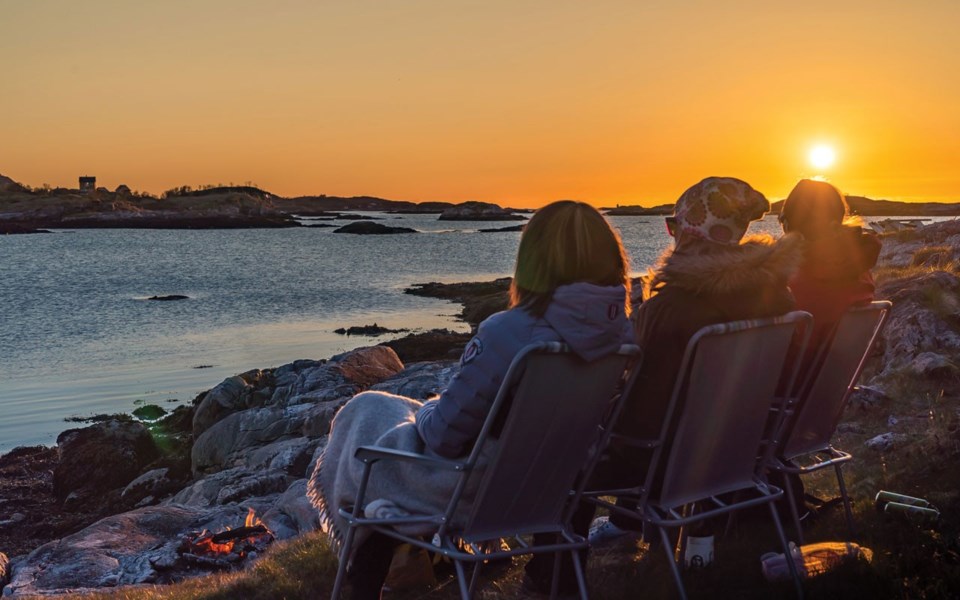Above latitude 66 degrees 33 minutes north, summer is a special time. That's because this northerly parallel—a.k.a. the Arctic Circle—is the official southern reach of the midnight sun. Summers may be vanishingly short up here when measured by the linear time frame we ascribe to seasons, but they're plenty long in the vertical plane—hours per day—that we don't pay much attention to unless we're farmers looking out for a particularly sun-loving crop. The halcyon heartbeat of summer in Whistler is aided in part by our late sunsets and early sunrises, but in the far north it's a whole new ball game.
The rays of the midnight sun—a warm, buoyant, umber light in which you can almost imagine you're swimming—is a magical reality for a few million around the circumpolar world, particularly in the many populated outposts of Scandinavia located above the Arctic Circle and moderated by the Gulf Stream to create perfect summer days along convoluted coastlines. Which brings us to Sommarøy ("Summer Island") off Norway's west coast near the city of Tromsø.
While many countries around the planet have recently taken to debating the utility of the continued anachronistic designation of Daylight Savings Time, the people of Sommarøy are taking the whole time argument one step further: with the midnight sun reigning over them from May 18 until July 26 each year, they're hoping they can get their island designated as a time-free zone.
"When you live in Northern Norway, it doesn't make much sense to talk about Daylight Savings Time, bedtime, dinner time—or any other time," says Kjell Ove, a spokesperson for the island's nominal Let's Stop Time movement. "During summer, the sun doesn't set for 69 straight days, so there's no real need to know what time it is. The midnight sun makes clocks an unnecessary nuisance, and so we wish to be a time-free zone."
It all started back in early May, when the islanders signed a petition to have the island declared time-free during a town hall meeting. On June 13, Ove met with a member of the Norwegian Parliament to hand over a schwack of locals' signatures and discuss practical and legal challenges of implementing what would be the world's first time-free zone.
A video (https://www.facebook.com/TimeFreeZone/videos/2113004195664449/) in which Ove explains the initiative (and smashes a few clocks for fun) has 150,000 views. Watching the short clip (notice how I didn't use a time signature?) it's easy to pick up on the base appeal of living outside the constraints of time when Ove states: "We do what we want, when we want. If you want to paint your house at 2 a.m.—it's OK. If we want to cut the grass at midnight, we will. If we want to take a swim at 4 a.m., we will."
Passionate about the concept and firmly behind the formal initiative, islanders have nevertheless been surprised by the huge amount of media attention they've received in their country, including many national news and public affairs shows, the largest national newspapers, and sage international publications like this one. It may be that the widespread popularity of the initiative has progressed so far beyond the islanders' expectations because it doesn't seem that strange to them, and speaking with the press, Ove would seem to agree. "This isn't a new concept to us. We merely want to formalize our island's way of living," he says. "We don't want to know what time it is, we want to have fun together and enjoy what the moment—what nature—and our community provides."
If the Norwegian government decides to approve the islanders' request, it would mean that citizens wouldn't have to adhere to regimented opening hours, deadlines, or other time-related requirements during the summer months. "To many of us, getting this in writing would simply mean formalizing something we have been practicing for generations—that is, time-free living. There's constant daylight, and so we act accordingly."
And it seems there may even be economic bait for those considering the request. Time-free living also aligns well with one of the island's largest industries, fishing. According to Ove, local fishers of both genders spend multiple days out on the ocean with no regard for time or sleep, while their families at home likewise have no clue when they'll be home and just roll with it. There's no real yesterday or today, just what did or didn't happen.
This isn't the island's first brush with horological quirkiness. In fact, the chronometer question is apparent the second you cross the bridge from the mainland to the island. The bridge isn't covered by padlocks declaring eternal betrothments like many European bridges; rather, it's covered in watches.
The ever-enthusiastic Ove believes that embracing timelessness on Sommarøy will not only have positive consequences for the community, but for visitors as well. "If Sommarøy legally becomes a time-free zone, it would constitute an important yet fun step. It would make us happy—and it might even attract some who wish to stress-out less and forget what time it is," he says.
It's been said that time waits for no one. But on Sommarøy, it appears, no one waits for time.
Leslie Anthony is a Whistler-based author, editor, biologist and bon vivant who has never met a mountain he didn't like.




